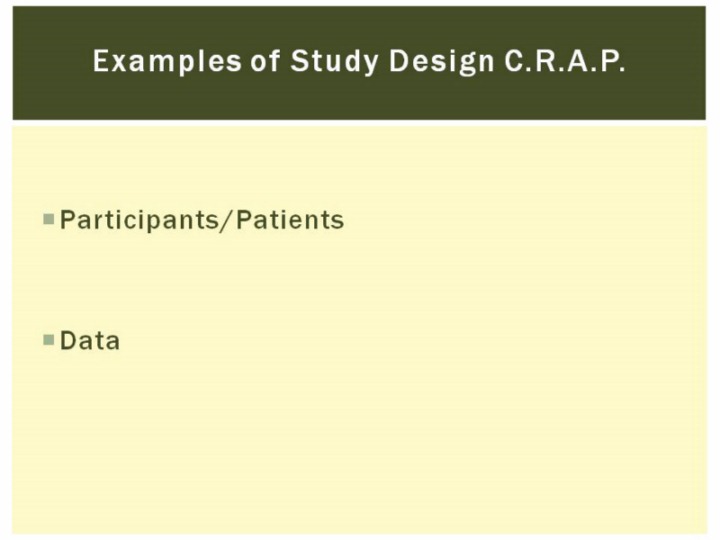| front |1 |2 |3 |4 |5 |6 |7 |8 |9 |10 |11 |12 |13 |14 |15 |16 |17 |18 |19 |20 |21 |22 |23 |24 |25 |26 |27 |28 |29 |30 |31 |32 |33 |34 |35 |36 |37 |38 |review |
 |
CRAP with Patients
1.24
lab draws with vital signs in 24 hours
2.30
hour study - pts were expected to stay on site during study period; but
were expected to sit in a chair while waiting for next round of labs
3.Pain
study - pt had have a catheter put in their backs in one dept.; then
needed to get an x-ray, in a different dept – in a different building.
When asked how pt went from one place to another, their plan was to roll
them down the street on a gurney.
4.Randomizing
pts based on self-report rather than qualitative testing
5.Leaving
out non-English speaking pts.
CRAP with Data
1.Physician-investigators
who say they are going to do their own data entry.
2.Storing
data on a “Sutter Network Drive” when, what they really mean a computer
hard-drive.
3.For
the data download in phase 1 of his study, I’ve asked for the prevalence
of the disorders. He could request the number of patients (not the
number of events) who have had these codes in a 6 month or 1 year period
– best if it is 2008. This number will tell me if downloading
information on all of those patients with personal identifiers is nearly
the same as his calculated sample size. If he asked IT to download
de-identified patient data to a PC, then this issue is less relevant.
4.No
information provided on data storage, how long data will be stored or
where, when destroyed and if so by who
General CRAP
1.Not
clarifying what is research and what is standard of care. If standard
of care (SOC) is to call patients using these questions, then consent
can be waived, even though these questions will be used in research.
This would seem to be a yes or no question. If yes, then in the waiver
application he can simply state that this is SOC and therefore consent
is unnecessary. If no, he could argue that obtaining face-to-face
consent is impractical due to the nature of the questions or the number
of patients to be contacted.
2.Methods
of informed consent - I really liked Kaiser's approach in the event a
written consent is waived, to either require that the researcher: 1)
send the patient a letter with a return addressed postage-paid opt out
response card; or 2) send the patient a letter informing him/her of the
study the telephone survey and the kinds of questions to be asked (no
patient response will be necessary), then using language in the initial
moments of the call to allow the patient a chance to decide if he/she
wanted to participate in the telephone interview. These methods provide
the patient with information about the study and the opportunity to
decide if they want to be involved and spares the researcher the
inconvenience or cost of face-to-face patient consent. If we decide
that Dr. Mainwarring's study should receive a HIPAA waiver, then he
could chose to use either of the Kaiser approaches and submit the letter
to the patient, the opt card or the text for the interview introduction
to the IRC.
|